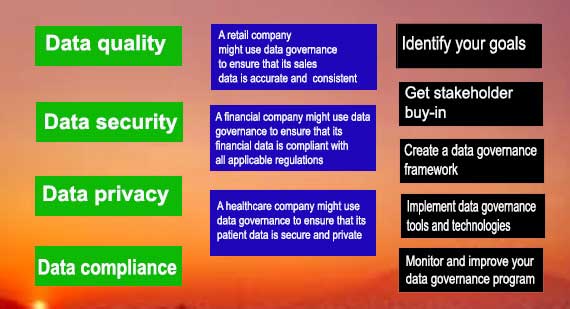Data governance in business intelligence (BI) is the process of managing data to ensure that it is accurate, consistent, and compliant with regulations.
Data Governance in Business Intelligence: Ensuring Data Integrity

Data governance in business intelligence (BI) is the process of managing data to ensure that it is accurate, consistent, and compliant with regulations. Data governance is important for BI because it ensures that the data that is being used to make decisions is reliable.
There are a number of different aspects to data governance in BI, including:
- Data quality: Data quality refers to the accuracy and completeness of data. Data governance policies and procedures should be in place to ensure that data is of high quality.
- Data security: Data security refers to the protection of data from unauthorized access, use, disclosure, disruption, modification, or destruction. Data governance policies and procedures should be in place to ensure that data is secure.
- Data privacy: Data privacy refers to the right of individuals to control their personal information. Data governance policies and procedures should be in place to ensure that data privacy is respected.
- Data compliance: Data compliance refers to the adherence to laws and regulations related to data. Data governance policies and procedures should be in place to ensure that data is compliant with all applicable laws and regulations.
Data governance is important for BI because it ensures that the data that is being used to make decisions is reliable. If the data is not accurate, consistent, or compliant, then the decisions that are made based on that data will be flawed.
Here are some specific examples of how data governance is used in BI:
- A retail company might use data governance to ensure that its sales data is accurate and consistent. This is important because the company uses its sales data to make decisions about inventory levels, pricing, and marketing campaigns.
- A financial company might use data governance to ensure that its financial data is compliant with all applicable regulations. This is important because the company could face fines or other penalties if its financial data is not compliant.
- A healthcare company might use data governance to ensure that its patient data is secure and private. This is important because the company has a legal obligation to protect patient data.
If you are using BI in your organization, it is important to have a data governance program in place. This will help you to ensure that the data that you are using to make decisions is reliable.
Here are some tips for developing a data governance program for BI:
- Identify your goals: What do you want to achieve with data governance? Do you want to improve data quality, security, privacy, or compliance? Once you know your goals, you can start to develop policies and procedures to achieve them.
- Get stakeholder buy-in: Data governance is a cross-functional initiative, so it is important to get buy-in from all stakeholders. This includes senior management, IT, business users, and data owners.
- Create a data governance framework: A data governance framework is a set of principles and guidelines that define how data will be managed in your organization. The framework should include policies and procedures for data quality, security, privacy, and compliance.
- Implement data governance tools and technologies: There are a number of different data governance tools and technologies available. The tools and technologies that you choose will depend on your specific needs and budget.
- Monitor and improve your data governance program: Data governance is an ongoing process, so it is important to monitor and improve your program on a regular basis. This includes reviewing your policies and procedures, assessing the effectiveness of your data governance tools and technologies, and measuring the progress that you are making towards your goals.
By following these tips, you can develop a data governance program that will help you to ensure the integrity of your data and improve the quality of your BI decisions.